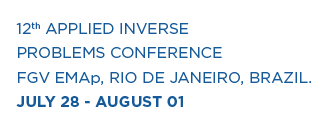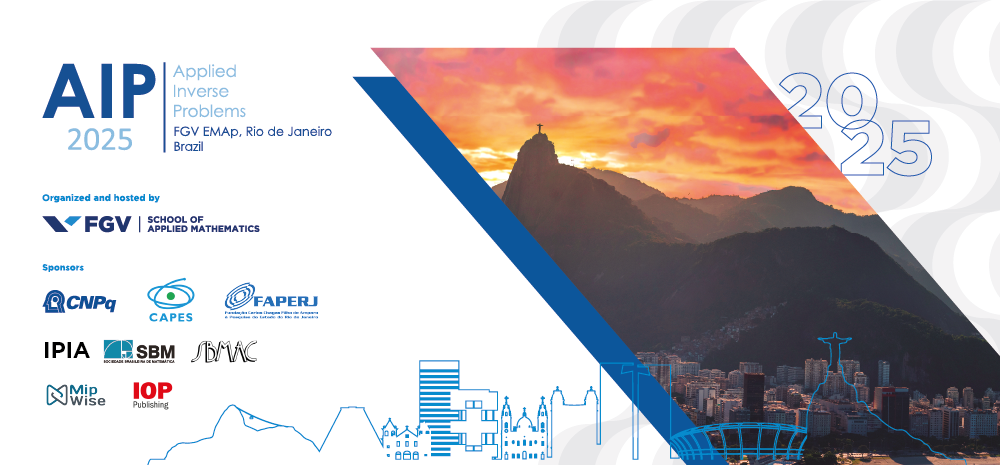AIP 2025
-
Prizes funded by IoP
As part of a celebration of the 40th anniversary of its flagship journal Inverse Problems, IoP will be awarding three prizes:
The Distinguished Scientist Award will be awarded to a researcher who has made significant contributions in the area of inverse problems.
- The prize will be awarded at the AIP conference in Rio, Brazil for the first time and includes a certificate and a prize of €1500.
- Nominations should be sent to otmar.scherzer@univie.ac.at by May 15, 2025. The nomination should include a nomination letter and two support letters (in total three supporters).The Best Paper Award is given to the author(s) of an outstanding paper published in the journal Inverse Problems in the years 2023-25.
- The prize will be awarded at the AIP conference in Rio, Brazil for the first time and includes a certificate and a prize of €1000.
- Nominations can only be made by members of the Inverse Problems Editorial Board.The Best Poster Award will be given to an excellent poster presentation at the AIP conference in Rio, Brazil.
- The award consists of a certificate and prize money of €500.
- The poster will be selected by a committee at the conference.Winners of the Prizes funded by IoP:
Distinguished Scientist Award: F. Alberto Grünbaum
Best Paper: Björn Müller, Thorsten Hohage, Damien Fournier and Laurent Gizon
Quantitative passive imaging by iterative holography: the example of helioseismic holographyBest Poster: Margaret Duff
Deterministic and Stochastic Optimisation Framework using the Core Imaging Library and Synergistic Image Reconstruction Framework for CT and PET Reconstruction -
On Applied Inverse Problems Conferences
Inverse Problems deal with the reconstruction of quantities of interest from indirect observations. They occur in medical imaging, non-destructive testing, geophysical exploration, astrophysical imaging, many high-resolution microscopy techniques, data mining, finance, econometrics, and other fields. Research on inverse problems combines techniques from mathematical analysis, differential geometry, numerical analysis, machine learning, image processing, scientific computing, and computer science.
The Applied Inverse Problems (AIP) conferences are organized biannually, the first one was held in Montecatini (2001). AIP have become the largest conference series in the field. The last meetings of this series took place in College Station, Texas (2011), Daejeon (2013), Helsinki (2015), Hangzhou (2017), Grenoble (2019), and Götingen (2023).
The next AIP Conference will be held at FGV EMAp, Rio de Janeiro, from July 28 to August 1, 2025 and will bring together academics, practicioners and researchers in the above mentioned areas.
The AIP 2025 conference is jointly organized by
• School of Applied Mathematics at Getulio Vargas Foundation, FGV EMAp (https://emap.fgv.br/en)
• Federal University of St. Catarina, UFSC (https://en.ufsc.br/)
• Inverse Problems International Association, IPIA (https://www.ipia.site/wp/)
-
Call for Minisymposium Proposals (Submission is closed)
We invite proposals for minisymposia containing the following information:
• Title (up to 100 characters)
• Names and affiliations of organizers
• Brief description of the topic (about half a page)
• List of speakers including affiliations and links to webpages if available.A minisymposium may have either 4, 8 or 12 speakers, possibly including the organizers. Each talk is allocated 30 minutes, which includes time for discussion. Speakers should be contacted in advance.
Please keep in mind that every participant may give at most two talks, preferably only one.There is also an option to submit posters. A limited number of posters will be showcased during a single 90-minute poster section (the number of posters is restricted by the local capacities).
-
Committees
Scientific Committee:
• Simon Arridge, Univ. College London, UK (https://ipia.site/wp/Executive-Committee/)
• Uri Ascher, UBC, Canada (https://www.cs.ubc.ca/~ascher/)
• Elena Beretta, NYU Abu Dhabi, UAE (https://ipia.site/wp/Executive-Committee/)
• Liliana Borcea, Michigan Univ., USA (http://www-personal.umich.edu/~borcea/)
• Fioralba Cakoni, Rutgers Univ., USA (https://sites.math.rutgers.edu/~fc292/)
• Elisa Francini, Università degli Studi di Firenze, Italy (https://people.dimai.unifi.it/francini/ric.html)
• Thorsten Hohage, Goettingen Univ., Germany (http://ip.math.uni-goettingen.de/index.php?section=members&subsection=th...)
• Alfredo Iusem, FGV EMAp, Brazil (https://emap.fgv.br/en/professors/alfredo-noel-iusem)
• Barbara Kaltenbacher, Klagenfurt Univ., AU (https://ipia.site/wp/Executive-Committee/)
• Katya Krupchyk, UCI, USA (https://www.math.uci.edu/~krupchyk/)
• Antonio Leitão (Chair), UFSC, Brazil (http://www.mtm.ufsc.br/~aleitao/)
• Shuai Lu, Fudan Univ., China (https://ipia.site/wp/Executive-Committee/)
• Carola-Bibiane Schönlieb, Cambridge Univ., UK (https://www.damtp.cam.ac.uk/user/cbs31/Home.html)
• Cristiana Sebu, Malta Univ., Malta (https://www.um.edu.mt/profile/cristianasebu)
• Samuli Siltanen, Helsinki Univ., Finland (https://researchportal.helsinki.fi/en/persons/samuli-siltanen)
• Tanja Tarvainen, Univ. of Eastern Finland, Finland (https://uefconnect.uef.fi/henkilo/tanja.tarvainen/)
• Gunther Uhlmann, Univ. of Washington, USA (https://ipia.site/wp/Executive-Committee/)
• Jorge Zubelli, Khalifa Univ., Abu Dhabi (https://www.ku.ac.ae/college-people/jorge-zubelli)Local Committee:
• Vinicius Albani, UFSC, Brazil (http://mtm.ufsc.br/~v.albani/)
• Liliane Barichello, UFRGS, Brazil (https://professor.ufrgs.br/lbbarichello/)
• Adriano DeCezaro, FURG, Brazil (https://imef.furg.br/servidores/docentes/matem/cezaro)
• Alexandre Kawano, USP, Brazil (https://bv.fapesp.br/pt/pesquisador/3271/alexandre-kawano/)
• Antonio Leitão, UFSC, Brazil (http://www.mtm.ufsc.br/~aleitao/)
• Majela Machado, UFBA, Brazil (http://www.dmat.ufba.br/docentes/majela-penton-machado)
• Fabio Margotti, UFSC, Brazil (https://fabiomargotti.paginas.ufsc.br/)
• Axel Osses, Univ. of Chile, Chile (https://personal.cmm.uchile.cl/axosses/)
• Yuri Saporito (Chair), FGV EMAp, Brazil (https://emap.fgv.br/en/professors/yuri-fahham-saporito)For more information, please contact:
E-mail: aip2025@fgv.br



